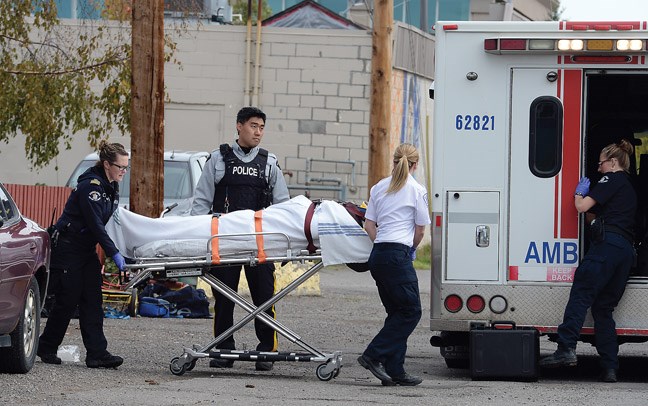The Prince George region is facing a shortage of paramedics resulting in chronic gaps in ambulance service and long hours for the city's remaining Emergency Health Services staff.
That's something University Hospital of Northern B.C. emergency room nurse Cherrie Cloarec knows all to well. Her husband has been a paramedic in the city for nine years. Cloarec said her husband, who she declined to name, isn't allowed to speak out about the problems, but said she felt people in the city need to know what is happening.
"It's very concerning when our community has only two ambulances available," Cloarec said. "There is just legit no paramedics. For the month of September, in Prince George alone, there (were) 71 shift vacancies, because (BC Emergency Health Services) will not hire local, experienced paramedics into full-time vacancies in their own communities."
Despite working full-time hours for years, her husband is still classed as a part-time paramedic and isn't entitled to sick time or holiday pay, she said.
"There's been times when he's been sick, but has said, 'I guess I have to go to work,' because he doesn't have sick time," Cloarec said. "It's shameful."
For her husband to apply for a full-time position, he would have to commit to working in Vancouver or a small, rural community for a minimum of six months, with no guarantee of returning to his home community, she said.
"That means leaving your families, causing financial hardship, all to staff Vancouver. In the meantime, communities like Prince George and other northern cities are living at risk with minimal EHS available," Cloarec said. "We deserve care in the north, and paramedics deserve equal hiring practices throughout the province."
Troy Clifford, provincial president of the Ambulance Paramedics of BC – the union which represents paramedics in B.C. – said he couldn't confirm the 71 vacant shifts in Prince George in September, but there were "significant vacancies" and it would be consistent with the ongoing situation.
"For the month of October in Prince George, we are hearing initial reports that 38 paramedic shifts are vacant. This does not account for additional shortages that may occur as the month progresses," Clifford said in an email. "Many of our paramedics are having to do forced overtime. In Prince George and other northern communities, we've had several months of staffing issues and shortages. Our paramedics are doing long days starting at 6 a.m., and on night shifts – sometimes going all night – back to back. Their fatigue levels are increasing and cannot be sustained."
Those unfilled shifts mean gaps in ambulance coverage in the region, he said.
"On September 5, Bear Lake, just outside Prince George, had no ambulance coverage.
On September 7, we had significant shortages between Prince George, Bear Lake and Mackenzie," Clifford said. "Paramedics are fatigued and 'timing out' (due) to workloads and safety. The ability to respond and paramedic coverage in those communities is and was definitely affected."
There are systemic issues which are making it hard to recruit and retain skilled paramedics in the province, especially in rural areas, he said.
"We cannot rely on a on-call model where paramedics carry a pager, being paid only $2 per hour until they are called out for a emergency or inter-facility transfer," Clifford said. "In many smaller rural remote and Indigenous communities, on-call paramedics remain on-call for 24 hours a day. The staffing and workload issues are affecting morale and community coverage."
Clifford said the union is calling on the province and BC Emergency Health Services to address the issue.
"(However,) for paramedics on the front lines and our patients, help cannot come quickly enough," Clifford said. "The community of Prince George and surrounding areas need support, funding, and an influx of resources."
A spokesperson for BC Emergency Health Services said she wasn't able to fully comment on the situation until after the provincial election on Oct. 24.
"We’d very much like to talk to you further about some of your other questions related to staffing and service levels, as well as a number of positive supports that have been put in place during the pandemic," BC Emergency Health Services spokesperson Sarah Morris said in an email. "Unfortunately, we are in an election period and during this time communications from government and health authorities is limited to essential public safety information and what is already publicly available."



